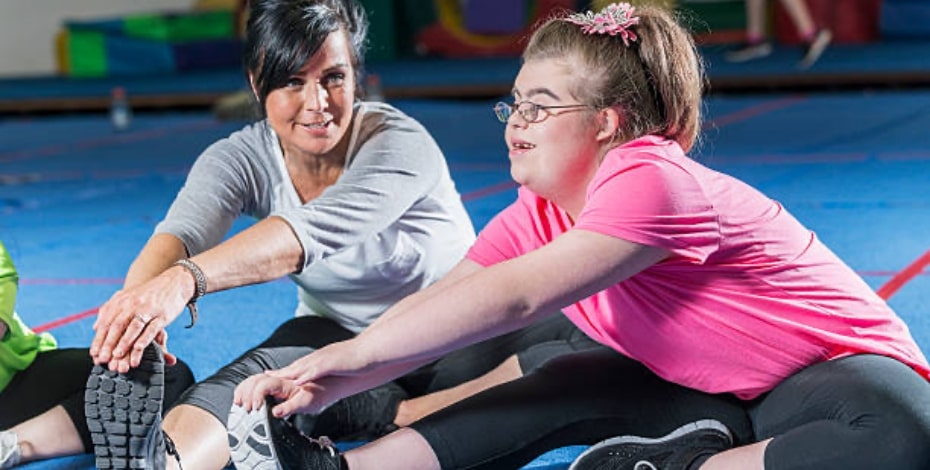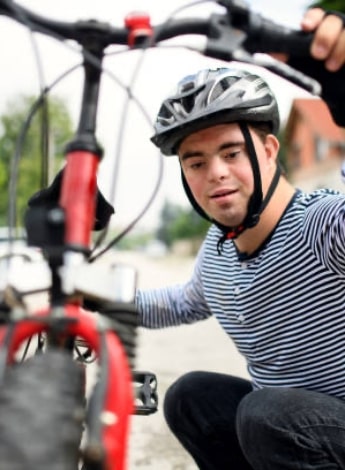
Down syndrome and physiotherapy

The effects of physiotherapy for people with Down syndrome were considered in an Invited Topical Review. Q&A with Nora Shields.
What is Down syndrome and how does it impact those who have it?
Down syndrome is a genetic condition.
Most people have 46 chromosomes in each of their cells; people with Down syndrome have 47.
They have an extra chromosome 21, which is why Down syndrome is also known as trisomy 21.
Every person with Down syndrome is different and has different skills and needs for support.
Typically, people with Down syndrome have some level of intellectual disability.
Also, there will be some delay in development, some level of learning difficulty, some characteristic physical features and an increased risk of some health conditions (eg, congenital heart abnormalities).
As everyone with Down syndrome is unique, these features will be different for each person.
Most of the young people growing up with Down syndrome today will lead ordinary lives in the community.
Some people with Down syndrome may not need much help to lead an ordinary life, while others may require a lot of support.
(Sourced from the Down Syndrome Australia website.)
What range of interventions did you consider in your review of the evidence about the effects of physiotherapy for Down syndrome?
I considered any intervention that is currently within the scope of, or could become part of, physiotherapy practice, similar to the criteria for inclusion on the PEDro database.

For people with Down syndrome, strengthening exercises are needed in addition to aerobic exercise to increase cardiorespiratory fitness.
I focused on evidence published over the past 20 years from randomised controlled trials involving people with Down syndrome of any age.
This included studies of early intervention, task-specific training, exercise, health education and behaviour change interventions.
Which of these interventions had evidence that showed their effectiveness?
Evidence for physiotherapy interventions for people with Down syndrome is sparse and available trials often lack methodological rigour.
That said, available evidence supports parent-delivered interventions with a primary focus (such as repetition of movement) and daily application to promote earlier developmental milestone attainment.
Task-specific training appears beneficial for children and adolescents with Down syndrome in learning and developing proficiency in motor skills, which is important because in people with Down syndrome, motor ability better predicts functional limitations than cognitive performance.
Health education and behaviour change interventions, which physiotherapists could implement as part of a multidisciplinary team, have benefits for adults with Down syndrome in improving attitudes towards exercise, participation in physical activity and weight loss.
Can you tell us more about exercise: what types of exercise had been investigated and which were effective?
The effects of aerobic training, progressive resistance training, combined aerobic and strength training and balance training have been investigated for people with Down syndrome.

Nora Shields's research investigates the effects of strength training for people with Down syndrome.
Aerobic training has positive effects on physical function, waist circumference and BMI when it is implemented with sufficient dose and intensity.
However, positive effects on cardiorespiratory fitness (relative peak oxygen uptake and pulmonary ventilation) were only found when aerobic exercise was combined with strengthening exercises.
This is likely because the lower cardiorespiratory fitness of people with Down syndrome is partially due to lower muscle quantity and quality.
Progressive resistance training is effective at increasing muscle strength.
What about future research in this area?
The most pressing health concern people with Down syndrome face is their ultra-high risk of cognitive decline, with an onset in their early 40s.
Only recently have researchers begun to investigate the effect of exercise on cognitive function in this population.
Animal and longitudinal studies suggest that regular, long-term, moderate-intensity to high-intensity exercise has the potential to reduce this risk of cognitive decline.
People with Down syndrome are also at higher risk of stroke, osteoporosis and diabetes.
Uncertainty remains about the long-term benefits of exercise in preventing these conditions in people with Down syndrome because of the lack of studies in this area.
>> Nora Shields is Professor of Physiotherapy at La Trobe University. Her research aims to improve the health and wellbeing of young people with disability by supporting their participation in exercise and physical activity. She has completed a series of randomised controlled trials investigating the effects of a community-based strength training program for people with Down syndrome. Nora established the FitSkills program in Melbourne in which young people with disability can exercise with a student mentor at their local gym.
© Copyright 2025 by Australian Physiotherapy Association. All rights reserved.





